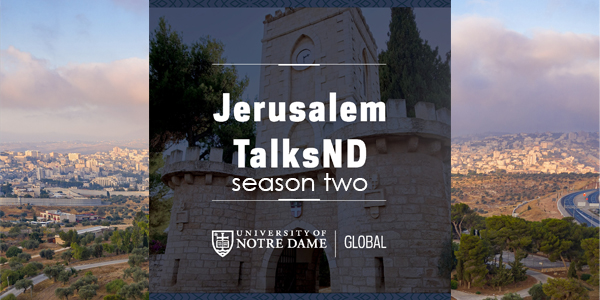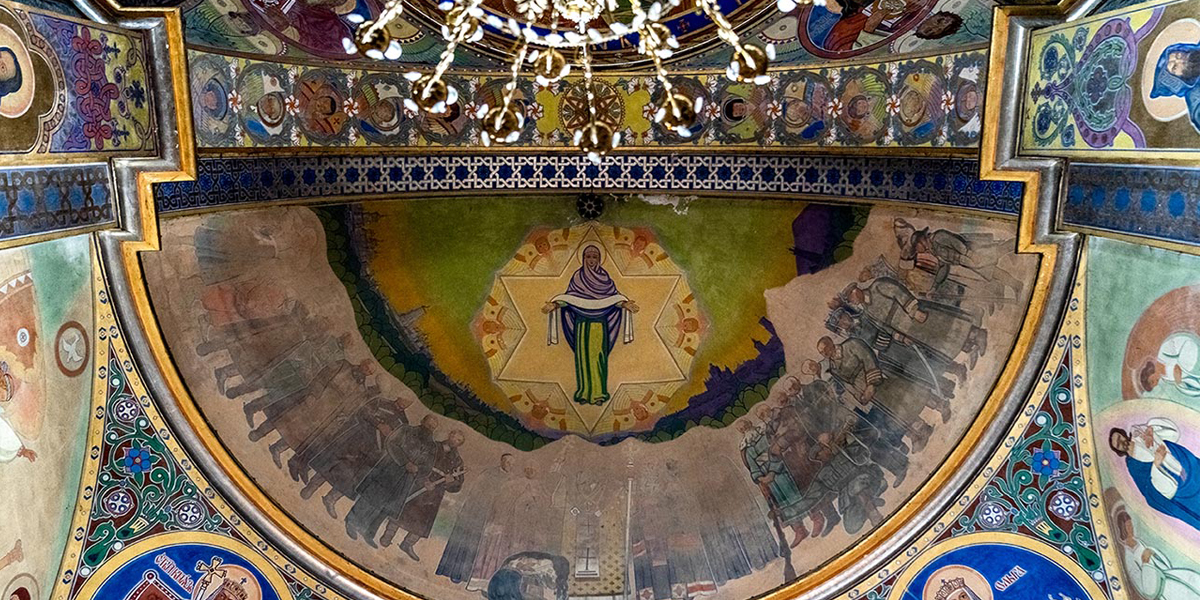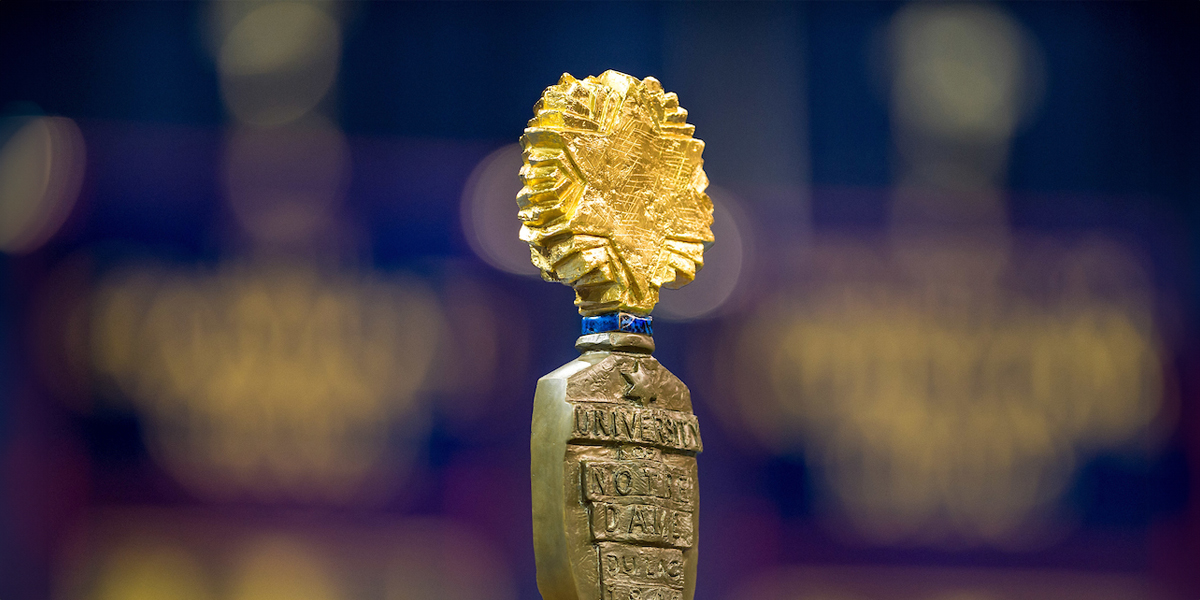Climate, Catastrophe, and Faith: How Changes in Climate Drive Religious Upheaval
On Saturday morning, October 1, 2022 visiting scholars and community members convened in McKenna Hall for the fall 2022 installment of the Cushwa Center’s semesterly Seminar in American Religion. The featured guest was Philip Jenkins, Distinguished Professor of History and co-director of the Program on Historical Studies of Religion at Baylor University, and discussion focused on his recent book Climate, Catastrophe, and Faith: How Changes in Climate Drive Religious Upheaval (Oxford, 2021). Kathleen Sprows Cummings opened the morning with greetings and introductions of Jenkins and the day’s two commentators, Peter J. Thuesen (Indiana University – Purdue University Indianapolis) and Celia Deane-Drummond (Campion Hall, University of Oxford).
Thuesen spoke first and began with a summary of the key variables that have defined Jenkins’ scholarly career: “good writing, temporal scope, and geographic scope.” All feature in Climate, Catastrophe, and Faith, and Thuesen praised Jenkins for composing an “accessible, engaging synthesis” suited as much to a general readership as to other scholars. In Thuesen’s assessment, the book deserves special commendation for reframing common episodes in American religious history. The Great Awakening of the 1730s and 1740s, the “burned-over district” of west-central New York, and the formation of the Church of Jesus Christ of Latter-day Saints all require reinterpretation once placed within their climatic contexts. If Climate, Catastrophe, and Faith explains many such moments in the past, Thuesen contended the book likewise proves suggestive regarding the future. The supposed “death of God,” he surmised, may not play out as anticipated—contemporary religiosity is greatest in those parts of the world with the strongest trends in population growth, which also happen to be the regions most susceptible to the damages of climate change.
“Beautifully written, erudite, a masterpiece”: with those superlatives, Deane-Drummond opened her reflections on Jenkins’ book. Like Thuesen, Deane-Drummond highlighted Jenkins’ treatment of the Global South, though in this case with some caution. Comparing episodes in the contemporary Global South with instances from early America not only conveys unintended “undertones” regarding relative stages of development, it also implies that those in the Global North have “grown away from risk.” She argued instead that the key reality of life in the Global South is the cruel irony that the region will endure the worst fallout of anthropogenic climate change despite having done the least to bring it about. Some of the content in Climate, Catastrophe, and Faith proved disheartening to Deane-Drummond as a theologian, with Jenkins recounting how historical actors have often understood climate catastrophe as a deserved result of personal or societal sin. Jenkins tempers these negative examples, however, with what Deane-Drummond called “encouraging exceptions,” moments in which historical figures responded well to changing climate conditions. That theme shaped her suggestion for a path forward. What if we could find an alternative way to read history—not ignoring violence, but instead choosing to accentuate the “peaceable” and the “virtuous,” a “history of hope . . . rather than despair and apocalypse”?
After a brief reply from Jenkins and the seminar’s customary coffee break, the gathering reassembled for an extended dialogue with the author. Brad Gregory (Notre Dame) distinguished the episodes in Climate, Catastrophe, and Faith caused almost entirely by factors such as sunspots, volcanic eruptions, and El Niño events from contemporary anthropogenic climate change. Jenkins agreed with Gregory that the distinction matters greatly for public policy but much less in terms of “projecting consequences or . . . religious implications.” Tom Tweed (Notre Dame) asked Thuesen and Jenkins whether the Buddhist concepts of “sudden religion” and “gradual religion” are germane to histories of climate, with sudden religion “more inclined to predominate at moments of crisis” and gradual religion that prioritizes “cultivation” reserved for moments of less climate stress. Jenkins embraced the typology’s application to the historical moments in his book, as did Thuesen, who asserted the entire history of Christianity is marked by efforts to harmonize the “apocalyptic” message of Jesus, that “this generation will not pass away before all these things come to pass,” with practical steps toward “institutionalization and codification.”
Multiple attendees asked Jenkins to reflect more on issues of causation. Janine Giordano Drake (Indiana University) wondered how climate interacted with another macro-process, the rise of global empires, while John McGreevy (Notre Dame) questioned whether climate would ever displace more familiar “social . . . intellectual . . . [and] cultural” explanations for historical change. Jenkins embraced the chance to engage these topics. In line with Drake’s query, Jenkins’ present book project considers empire’s role in shaping world religions, with many empires themselves having “risen or fallen in connection with . . . climate episodes.” While Jenkins granted McGreevy’s point regarding moments of climate crisis that did not yield dramatic religious change, he insisted the presence of exceptions “does not invalidate . . . [climate’s] strongly predictive power” as a factor in religious change. In response, Deane-Drummond advocated thinking in terms of “mediating categor[ies],” as research has demonstrated how certain “changes in the social sphere have been also traced” to prior climate changes.
Other seminar participants discussed how the book had inspired possible angles for future research. Jack Young (Notre Dame) inquired about historical actors who have interpreted climate catastrophe as proof of “divine absence”; might attention to climate provide a way of understanding the rise of the secular? Thuesen concurred, citing as exemplary the Scottish philosopher David Hume and his 1757 essay, “The Natural History of Religion.” Rachel Wheeler (Indiana University – Purdue University Indianapolis) proposed an inversion of Jenkins’ research project: future scholars might explore how religious adaptations have reoriented approaches to climate change, an instinct that Jenkins affirmed. And in reply to a comment by Jana Riess (Religion News Service), Jenkins observed disturbing parallels between the COVID-19 pandemic and the climate catastrophes outlined in his book, including the “construction of myths . . . [and] scapegoating” that emerged to make sense of the suffering. After entertaining these and many other observations from the guests, Cummings invited the three panelists to make final remarks before thanking the audience members and inviting them to return for the center’s spring 2023 seminar.
This recap was originally published by the Cushwa Center for the Study of American Catholicism in the article “In review: Fall 2022 at the Cushwa Center” and was written by Philip Byers, a postdoctoral research associate at the University of Notre Dame’s Cushwa Center.
October 1, 2022
More Like This
Related PostsLet your curiosity roam! If you enjoyed the insights here, we think you might enjoy discovering the following publications.







